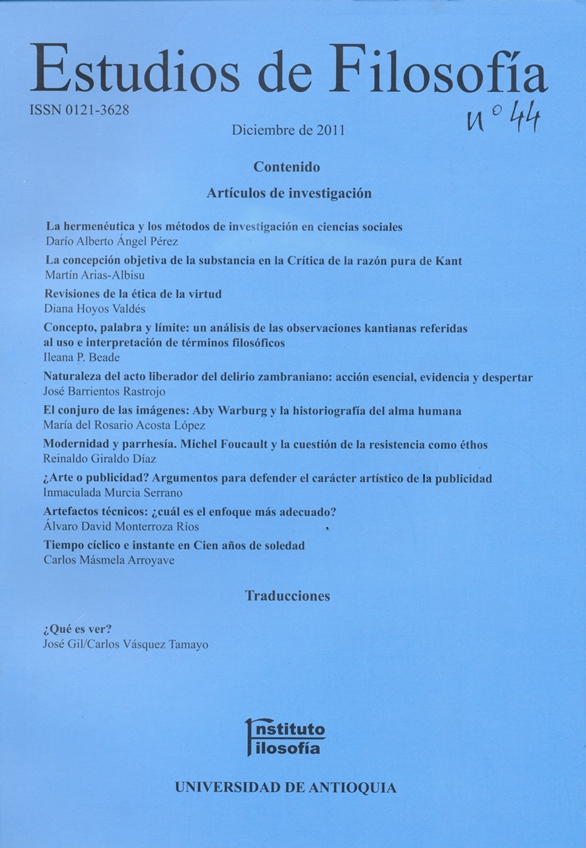The Objective Conception of Substance in Kant’s Critique of Pure Reason
DOI:
https://doi.org/10.17533/udea.ef.12634Keywords:
Kant, transcendental philosophy, substance, duality, transcendental schemaAbstract
The aim of this paper is to examine a duality in the objective conception of substance in Kant’s Critique of Pure Reason. With this purpose in mind, I analyze the transcendental schema of the category of substance and accident. My hypothesis is that two different conceptions of substance can be distinguished in the Kantian text. On the one hand, substances1 are the relatively permanent objects of everyday experience. On the other hand, substance2 is the absolutely permanent matter of which substances1 are made. Since substances1 are accidents or ways of existing of substance2, both conceptions are part of a coherent theory.
Downloads
References
ALLISON, H. E. (1983) Kant’s Transcendental Idealism. An Interpretation and Defense, New Haven/London, Yale University Press.
ALLISON, H. E. (1992) El idealismo trascendental de Kant: una interpretación y defensa, Trad. de D. M. Granja Castro, Barcelona, Anthropos.
ARIAS ALBISU, M. (2010) Los esquemas trascendentales como procedimientos y productos, Revista de filosofía, Madrid, vol. 35 (2), pp. 27-42.
BENNETT, J. (1966) Kant´s Analytic, Cambridge, Cambridge University Press.
CAIMI, M. (2000) Einige Bemerkungen über die Metaphysische Deduktion in der Kritik der reinen Vernunft, Kant Studien, Berlin, vol. 91 (3), pp. 257-292. DOI: https://doi.org/10.1515/kant.2000.91.3.257
CAIMI, M. (2004) Consideraciones sobre la función de los «juicios infinitos», Ágora, Santiago de Compostela, vol. 23 (1), pp. 29-38.
DETEL, W. (1978) Zur Funktion des Schematismuskapitels in Kants Kritik der reinen Vernunft, Kant Studien, Berlin, vol. 69 (1), pp. 17-45. DOI: https://doi.org/10.1515/kant.1978.69.1-4.17
DÜSING, K. (1995) Schema und Einbildungskraft in Kants Kritik der reinen Vernunft. En: Kreimendahl, L. (ed.). Aufklärung und Skepsis. Studien zur Philosophie und Geistesgeschichte des 17. und Jahrhunderts. Günter Gawlick zum 65. Geburtstag, Stuttgart-Bad Cannstatt, Frommann-Holzboog, pp. 47-71.
FRIEDMAN, M. (2001) Matter and Motion in the Metaphysical Foundations and the First Critique: The Empirical Concept of Matter and the Categories. En: Watkins, E. (ed.). Kant and the Sciences, Oxford, Oxford University Press, pp. 53-69 DOI: https://doi.org/10.1093/0195133056.003.0004
HEIDEGGER, M. (1962) Die Frage nach dem Ding. Zu Kants Lehre von den Transzendentalen Grundsätzen, Gesamtausgabe 41, Frankfurt am Main, Vittorio Klostermann.
KANT, I. (1902 ss.) Kant’s gesammelte Schriften, Berlin, hrsg. von der Königlich Preußischen Akademie der Wissenschaften (AA).
KANT, I. (2007) Crítica de la razón pura, Trad. de M. Caimi, Buenos Aires, Colihue.
LOCKE, J. (1894) An Essay concerning Human Understanding, Oxford, ed. A. C. Fraser.
LONGUENESSE, B. (2000) Kant and the Capacity to Judge, Trad. de C. T. Wolfe, Princeton, Princeton University Press. Martín Arias-Albisu
PATON, H. J. (1970) Kant’s Metaphysic of Experience. A Commentary on the First Half of the Kritik der reinen Vernunft, London, George Allen & Unwin Ltd.
ROSALES, A. (1993) Una pregunta sobre el tiempo. En: Rosales, A. Siete ensayos sobre Kant, Mérida, Universidad de los Andes, 1993, pp. 225-250.
STRAWSON, P. F. (1966) The Bounds of Sense. An Essay on Kant’s Critique of Pure Reason, London/New York, Methuen.
VAN CLEVE, J. (1979) Substance, Matter, and Kant’s First Analogy, Kant Studien Berlin, vol. 70 (2), pp. 149-161. DOI: https://doi.org/10.1515/kant.1979.70.1-4.149
WALKER, R. C. S. (1971) The Status of Kant’s Theory of Matter, Synthese, Dordrecht, vol. 23 (1) pp. 121-126. DOI: https://doi.org/10.1007/BF00414148
WARD, A. (2001) Kant’s First Analogy of Experience, Kant Studien, Berlin, vol. 92 (4), pp. 387-406. DOI: https://doi.org/10.1515/kant.2001.001
WOLFF, M. (1995) Die Vollständigkeit der kantischen Urteilstafel. Mit einem Essay über Freges “Begriffsschrift”, Frankfurt am Main, Vittorio Klostermann. DOI: https://doi.org/10.3196/9783465028116
Downloads
Published
How to Cite
Issue
Section
Categories
License
Copyright (c) 2011 Martín Arias-Albisu

This work is licensed under a Creative Commons Attribution-NonCommercial-ShareAlike 4.0 International License.
Authors who publish with this journal agree to the following terms:
1. The Author retains copyright in the Work, where the term "Work" shall include all digital objects that may result in subsequent electronic publication or distribution.
2. Upon acceptance of the Work, the author shall grant to the Publisher the right of first publication of the Work.
3. The Author shall grant to the Publisher a nonexclusive perpetual right and license to publish, archive, and make accessible the Work in whole or in part in all forms of media now or hereafter known under a Creative Commons Attribution-NoCommercia-ShareAlike (CC BY-NC-SA 4.0), or its equivalent, which, for the avoidance of doubt, allows others to copy, distribute, and transmit the Work under the following conditions: (a) Attribution: Other users must attribute the Work in the manner specified by the author as indicated on the journal Web site;(b) Noncommercial: Other users (including Publisher) may not use this Work for commercial purposes;
4. The Author is able to enter into separate, additional contractual arrangements for the nonexclusive distribution of the journal's published version of the Work (e.g., post it to an institutional repository or publish it in a book), as long as there is provided in the document an acknowledgement of its initial publication in this journal;
5. Authors are permitted, and Estudios de Filosofía promotes, to post online the preprint manuscript of the Work in institutional repositories or on their Websites prior to and during the submission process, as it can lead to productive exchanges, as well as earlier and greater citation of published work (see The Effect of Open Access). Any such posting made before acceptance and publication of the Work is expected be updated upon publication to include a reference to the Estudios de Filosofía's assigned URL to the Article and its final published version in Estudios de Filosofía.















